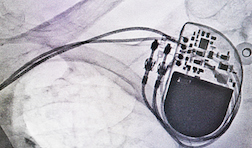 The software tool is certainly too late for the two patients who died when their St. Jude batteries failed.
The software tool is certainly too late for the two patients who died when their St. Jude batteries failed.It’s been a little over a year since the US Food and Drug Administration (FDA), in concert with the manufacturer, issued a St. Jude recall with regard to certain devices in the St. Jude Fortify, Unify and Assura defibrillator line. Batteries designed to last upwards of five years were failing prematurely and suddenly, with little contingency time to schedule and undertake a battery replacement.
The original St. Jude recall was issued October 20 of last year. Last month, the FDA updated its recall to include new information about the availability of a “St. Jude Battery Performance Alert (BPA),” which was described as a management tool designed to provide earlier detection of imminent battery failure for the implanted heart devices.
St. Jude itself issued a communication to doctors in late August of this year, announcing the availability of the new software tool that works in concert with a patient’s remote monitoring system. The software is described as employing an algorithm capable of detecting abnormal battery performance before a battery actually fails. The BPA issues an alert when it detects a battery is behaving abnormally, with a corresponding recommendation that the failing device is immediately removed and replaced.
“Battery information is uploaded automatically each night to Merlin.net where the most recent 32 days of data are analyzed each day to determine if an anomalous battery voltage trend is observed,” St. Jude wrote to its customers. “Once the BPA is triggered, notification is provided to physicians through the Merlin.net monitoring system and the Merlin programmer during routine follow-up evaluations. For patients not followed remotely with Merlin.net, the status of their battery and whether the BPA has triggered an alert can only be determined with in-person interrogation using the Merlin programmer.”
READ MORE ST JUDE CARDIAC DEFIBRILLATORS LEGAL NEWS
St. Jude has said that it was unable to confirm the issue until after the recall had been announced a year ago. However, plaintiffs behind St. Jude ICD and CRT-D device lawsuits allege St. Jude knew as early as 2011 about the battery problems, but failed to alert the medical community and continued to distribute units carrying the problematic batteries.
